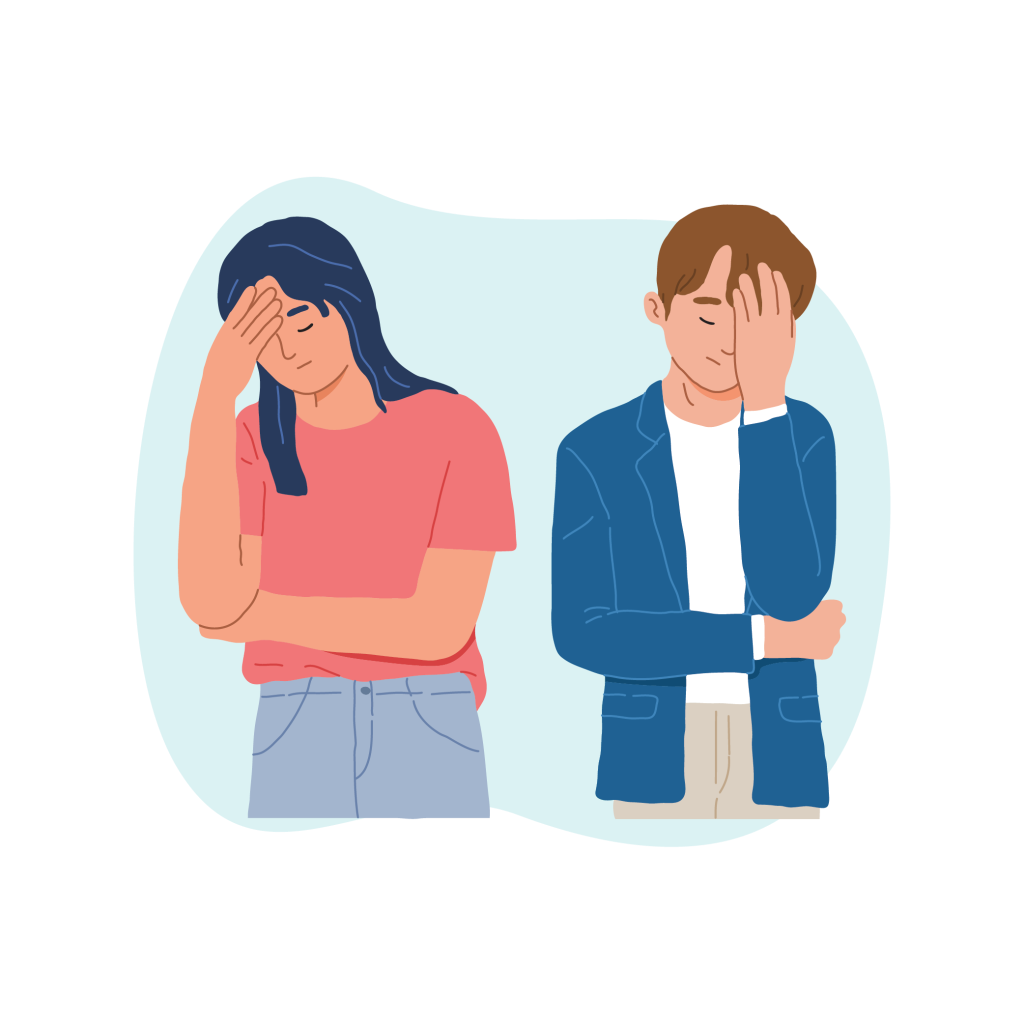Depression Treatment
in Atlanta
At Atlanta Integrative Psychiatry, we treat all types of depression, including those with complex cases, such as treatment-resistant depression, seasonal affective disorder, depression and personality disorder, persistent depressive disorder, depression and anxiety, and depression and psychosis. Our experienced team of psychiatrists and mental health professionals work with our patients to develop personalized treatment programs to help them with their depression.

What Is Depression?
Depression is a mental disorder characterized by persistent sadness and loss of interest in activities. It is usually accompanied by various physical and psychological symptoms, including fatigue, insomnia, changes in appetite, difficulty concentrating, feelings of guilt or worthlessness, and thoughts of self-harm or suicide.
According to the National Institute of Mental Health (NIMH), in 2021, estimated 21.0 million adults in the United States (8.3%) had at least one major depressive episode (MDE). In addition, the prevalence of MDE was higher among women (10.3%) compared to men (6.2%). MDE in adults was highest among people aged 18-25 (18.6%).
What to Expect During Depression Treatment in Atlanta
Depression treatment in Atlanta typically consists of an initial consultation and psychiatric evaluation to determine the best course of treatment for the patient. For example, treatment can include cognitive-behavioral therapy (CBT), mental health medication, and lifestyle changes.
- CBT is a type of talk therapy that focuses on identifying and changing negative thought patterns and behaviors.
- Medication may include antidepressants, mood stabilizers, or anti-anxiety medications.
- Lifestyle changes may include exercise, nutritionist services, stress management, and improved sleep habits.
Additionally, therapists may recommend other treatments, such as group therapy, art therapy, or mindfulness. Our psychiatrists and mental health professionals will help develop a treatment plan tailored to your specific type of depression.
Signs and Symptoms of Depression
Signs and symptoms of depression can vary from person to person and can include the following:
- A sense of worthlessness.
- Feelings of guilt and shame.
- Feelings of hopelessness.
- Extreme persistent sadness.
- Changes in eating habits - eating more or eating less.
- Difficulty sleeping or sleeping excessively.
- Lethargic with low energy levels.
- Lack of interest in activities and hobbies once enjoyed.
- Problems focusing, concentrating, and making decisions.
- Thoughts of self-harm and suicide.
- Digestive and gastrointestinal issues.
- Body aches and pain.
- Persistent headaches.
- Excessive alcohol or substance use.
If you believe you are struggling with depression but are not sure, take our "Am I Depressed" Quiz now for answers!

- Causes of Depression
- Signs and Symptoms of High-Functioning Depression
- Signs and Symptoms of Treatment-Resistant Depression (TRD)
- How Does Outpatient Depression Treatment in Atlanta Work?
The exact cause of depression is not fully understood, but it likely involves a combination of biological, environmental, and psychological factors. Sometimes, depression could occur due to an alcohol use disorder (AUD) or addiction and substance use disorder (SUD).
- Biological causes may include an imbalance in brain chemicals such as serotonin or dopamine.
- Environmental factors may include traumatic life events or a stressful environment.
- Psychological factors may include low self-esteem, difficulty managing emotions, and negative thought patterns.
As such, it is essential to remember the causes of depression will vary from one individual to another. Therefore, treatments must be tailored to each person based on the underlying causes of their depression.
High-functioning depression is a type of depression in which the person appears to be functioning normally on the outside but has symptoms of depression on the inside. Signs and symptoms may include:
- Persistent feelings of sadness or emptiness.
- Difficulty concentrating or making decisions.
- Fatigue and low energy levels.
- Changes in appetite or sleep habits
- Irritability and mood swings.
- Loss of interest in activities once enjoyed.
- Appearing outwardly happy to hide one’s depression.
Treatment-resistant depression (TRD) is a type of depression that does not respond to traditional treatments such as medication or talk therapy. The signs and symptoms one experiences are similar to other types of depression.
Outpatient depression treatment in Atlanta involves a structured treatment program tailored to the patient’s needs. Patients usually meet several days weekly for sessions ranging from two to four hours a day.
Most patients continue to work, attend school, and take care of their other responsibilities while residing at home. Outpatient depression treatment programs are an excellent opportunity for people to get depression treatment while maintaining their everyday routines.
In addition, outpatient depression treatment can benefit people who have recently completed an inpatient program. Transitioning to normal routines can become overwhelming for some people, so continuing treatment through an outpatient program can provide the assistance they need to navigate the real world.
Effective Treatments for Depression
Effective treatments for depression include a wide range of different types of therapies, counseling, and medications, including the following:
TMS therapy in Atlanta is a non-invasive treatment for depression that uses magnetic fields to stimulate specific brain areas. It is believed that this stimulation can help reduce symptoms of depression, such as low mood, fatigue, difficulty concentrating, and changes in appetite or sleep habits. TMS is an effective option for people who do not respond well to traditional treatments such as medication and talk therapy.
Ketamine therapy is a type of medication-assisted treatment for depression that involves using an FDA-approved nasal spray (Spravato) or intravenous infusion (ketamine). The active ingredient in both medications is esketamine, which is effective in treating symptoms of depression. It works by changing the balance of certain neurotransmitters in the brain and may provide rapid relief from depressive symptoms.
Psychotherapy is a type of treatment for depression that involves talking with a mental health professional about your thoughts, feelings, and behaviors. The goal of psychotherapy is to help you learn how to manage stress better, identify and change negative thought patterns, and develop coping skills so that you can better manage symptoms of depression. Research has shown that psychotherapy combined with medication can effectively treat depression.
Genetic testing can be used to help identify genetic variants that are related to depression. Testing can also help identify which types of medications could be the most effective at treating a person’s depression.
Psychiatric evaluations are usually the initial step in depression treatment. The evaluation helps psychiatrists and mental health professionals better understand the patient’s psychological and emotional state. In addition, psychiatric evaluations are helpful in developing a customized treatment plan.
Medication-assisted treatment (MAT) for depression typically involves using antidepressants, mood stabilizers, or anti-anxiety medications. The goal of MAT is to help regulate brain chemicals such as serotonin and dopamine.
Nutritional services for depression typically involve dietary changes designed to improve overall health and wellness. A nutritionist or dietitian can provide guidance on making healthy food choices and recommend supplements or vitamins if needed.
Eating a balanced diet with plenty of fruits, vegetables, and whole grains can help reduce symptoms of depression by providing essential nutrients to the body. Additionally, drinking enough water and limiting processed foods and added sugars are vital for good mental health.
Start Depression Treatment in Atlanta, GA Today
If you are looking for help with your depression, Atlanta Integrative Psychiatry our experienced team of mental health professionals is here to help. We offer a variety of treatment options that are personalized to your specific needs. Contact us today to learn more about our psychiatric services to schedule an initial consultation appointment.
Sources:
Chiu, A. (2022). What Does ‘High-Functioning Depression’ Mean? We Asked Experts.
Cuijpers P, Sijbrandij M, Koole SL, Andersson G, Beekman AT, Reynolds CF. (2014). Adding Psychotherapy to Antidepressant Medication in Depression and Anxiety Disorders: A Meta-Analysis.
Merz, B. (2020). Six Common Depression Types.
You are not alone. You deserve to get help.
Atlanta Integrative Psychiatry is an Industry leader in mental health treatment . Our team of top medical experts specialize in dual diagnosis treat and are committed to ensuring that each patient is treated as an individual.
Call us today, we're avialable 24/7.




